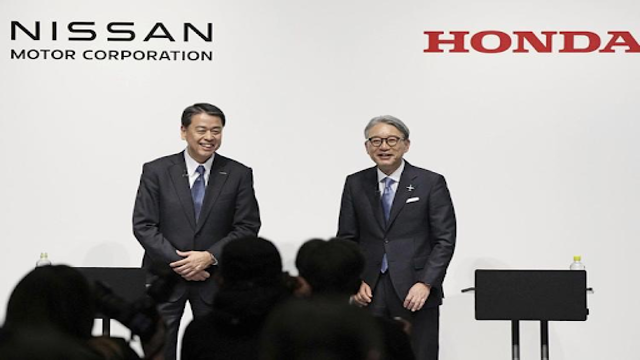
Nissan CEO and Honda President at a joint news conference in Tokyo, Friday, March 15, 2024. AP Photo
Japanese automakers Nissan Motor Corp. and Honda Motor Co. confirmed on Wednesday that they are exploring opportunities for deeper collaboration, but they rejected speculation of an impending merger. This announcement came after reports emerged suggesting that the two companies were in talks to create a new alliance, potentially making them the third-largest automaker group globally. Following these reports, Nissan's stock surged by over 22%, while Honda’s shares dropped by as much as 3%.
The rumors also indicated that Mitsubishi Motors, a member of the Nissan alliance, was part of the discussions.
This comes after an announcement in August where the three automakers revealed plans to share key components for electric vehicles, including batteries, and collaborate on autonomous driving software development. This initiative aims to help them better adapt to the rapid transformations in the automotive industry driven by electrification. Earlier this year, a preliminary agreement was made between Nissan and Honda to work more closely.
In response to the merger speculation, Nissan's stock trading was temporarily halted before resuming with a joint statement from both companies. The statement clarified that while they are considering various avenues for future collaboration, no final decisions have been made.
If a merger were to occur, the combined entity would have a market capitalization of around $55 billion, positioning it as a formidable competitor to industry leaders like Toyota and Volkswagen.
The potential partnership could provide Nissan and Honda with greater scale, enabling them to better compete in the evolving global automotive market. However, Nissan is also facing challenges in its current alliance with Renault SA, which is under review. The company recently announced plans to cut 9,000 jobs, or about 6% of its global workforce, and reduce production capacity by 20% after reporting a loss of 9.3 billion yen ($61 million) for the quarter. In a bid to improve financial performance, Nissan also reshuffled its management, with CEO Makoto Uchida taking a 50% pay cut.
Meanwhile, Honda has also faced difficulties, with profits falling nearly 20% in the first half of its fiscal year, largely due to a decline in sales in China. The rise of Chinese automakers and the ongoing transition to electric vehicles are reshaping the global automotive landscape, putting further pressure on traditional manufacturers.
In terms of production, Toyota continues to lead, with 11.5 million vehicles made in 2023. Honda produced 4.2 million, Nissan 3.4 million, and Mitsubishi just over 1 million. Even with a potential merger, Toyota would remain the largest automaker in Japan.















